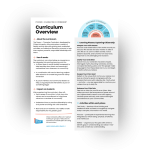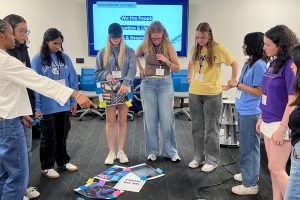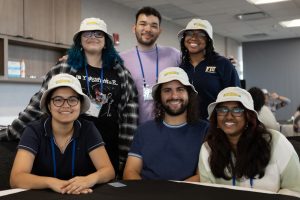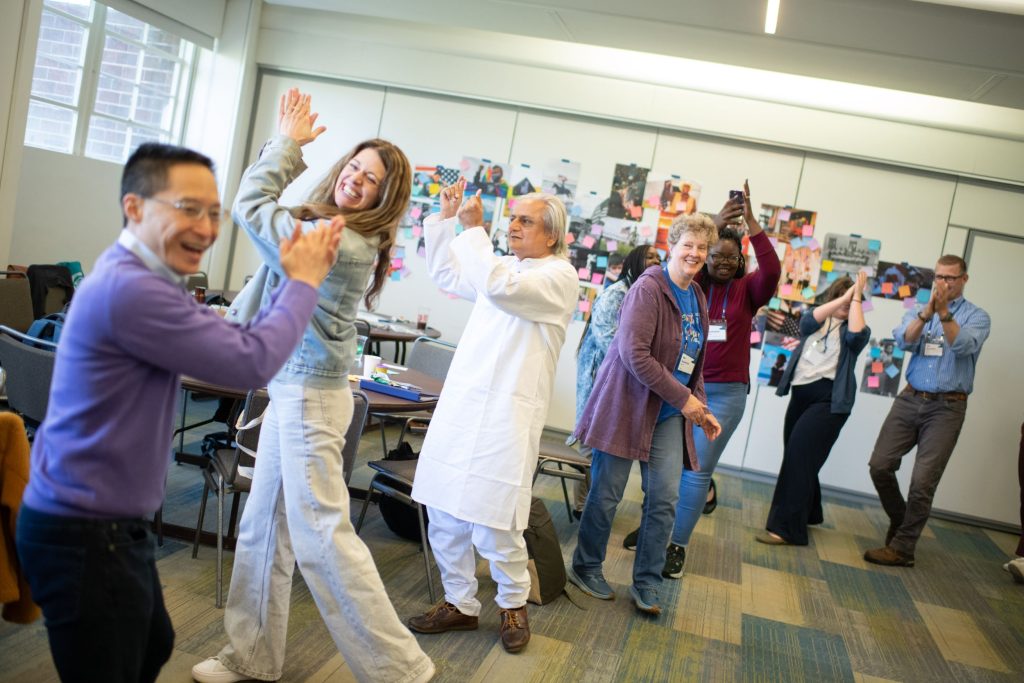The Power + Character Curriculum
Educators and youth facilitators, this curriculum is for you.
Through reflective discussion prompts, embodied exercises, and texts to study, this resource is designed to help you support students in:
- Deepening their understanding of their own agency and responsibility as a citizen
- Practicing healthy civic habits that they can continue to grow
- Articulating their own civic values, and why it matters to them to participate
 Whether embedded into classroom teaching, as the foundation for a summer camp, or anything in between, this set of resources is meant to be tailored to your place and your people. And importantly, it includes a framework for celebration — a ceremony for each student to share why their community matters to them, and what they want to commit to as a powerful, responsible citizen.
Whether embedded into classroom teaching, as the foundation for a summer camp, or anything in between, this set of resources is meant to be tailored to your place and your people. And importantly, it includes a framework for celebration — a ceremony for each student to share why their community matters to them, and what they want to commit to as a powerful, responsible citizen.
Psst! Interested in an in-person training on this content? We’ve got a limited number of training slots available!
Learn more →
Use the curriculum
We offer full access to the curriculum guidebook with the hopes that you’ll use it — in full or in part — to expand and deepen the way you approach civics with your students. Its modular design will enable you to find the activities that fit your context.
Fill out the form below and we’ll email you a copy of the curriculum as an editable Google Doc so you can jump right to making it your own.
Curriculum case studies
In training, coaching, and working alongside educators across the country, we’ve seen some imaginative and impactful adaptations of the Power + Character Curriculum.
As a summer camp
 As Executive Director of North Carolina Campus Engagement, Leslie Garvin brought the curriculum to life through a summer camp. This week-long immersion in civic identity kicked off a full academic year of civic practice. “The goal,” she said, “was to build a sustainable and empowering cycle—where past participants become mentors for the next cohort, fostering real continuity.” After the immersive camp, students worked on local civic impact projects throughout the summer and fall, with ongoing mentorship and support.
As Executive Director of North Carolina Campus Engagement, Leslie Garvin brought the curriculum to life through a summer camp. This week-long immersion in civic identity kicked off a full academic year of civic practice. “The goal,” she said, “was to build a sustainable and empowering cycle—where past participants become mentors for the next cohort, fostering real continuity.” After the immersive camp, students worked on local civic impact projects throughout the summer and fall, with ongoing mentorship and support.
As an educational leadership course
Kristin Koch integrated these ideas into an eight-week leadership course at William Peace University, focusing on students who were often “not the most prepared for the real world.” The sessions created space for them to reflect on identity, community, and civic responsibility through a social change leadership lens. “As part of orientation, we use [this program] to foster a sense of civic responsibility among incoming students,” Kristin shared. Students explored deep listening, moral reflection, joining, and power over eight 90-minute sessions. A highlight was the culminating celebration, co-created with students as both a personal and public declaration of civic commitment. Her students left more rooted, more reflective, and more empowered; Kristin plans to continue the program each semester.
As part of an organization’s approach
 Jacob Merkle, Executive Director of Rhizome, has helped weave the this curriculum into the very DNA of their youth organizing network. Working with over 250 high school Fellows and dozens of college-aged organizers, Rhizome embraced the curriculum as a cultural framework, not just a training tool. “(It) brought a fresh lens to our work,” Jacob shared. “It helped our organizers redefine patriotism and deepen their sense of shared civic belonging.” They’ve begun integrating shared civic language into their twice-yearly orientations, using the values of power, responsibility, and imagination to anchor everything from facilitation to organizing campaigns. “The language and tools are now just part of the water,” Jacob said.
Jacob Merkle, Executive Director of Rhizome, has helped weave the this curriculum into the very DNA of their youth organizing network. Working with over 250 high school Fellows and dozens of college-aged organizers, Rhizome embraced the curriculum as a cultural framework, not just a training tool. “(It) brought a fresh lens to our work,” Jacob shared. “It helped our organizers redefine patriotism and deepen their sense of shared civic belonging.” They’ve begun integrating shared civic language into their twice-yearly orientations, using the values of power, responsibility, and imagination to anchor everything from facilitation to organizing campaigns. “The language and tools are now just part of the water,” Jacob said.

Experience our educator training
We know that transformational learning happens best with others. That’s why we’ve designed a two-and-a-half day experiential training program that provides an enriching deep dive into this work yourself — and we travel to you! Citizen University brings our Power + Character training to groups of youth facilitators & educators who want to get a deeper dive into how to teach this material, by engaging in the civic skill building, community reflection, and critical thinking that you’ll be leading your students through.
We know how much heart educators pour into your work — that’s why you deserve to experience the same sort of transformative activities that spark reflection and recommitment you hope to inspire in your students.
Sound exciting? Share the Power + Character training information with your director or administrators.